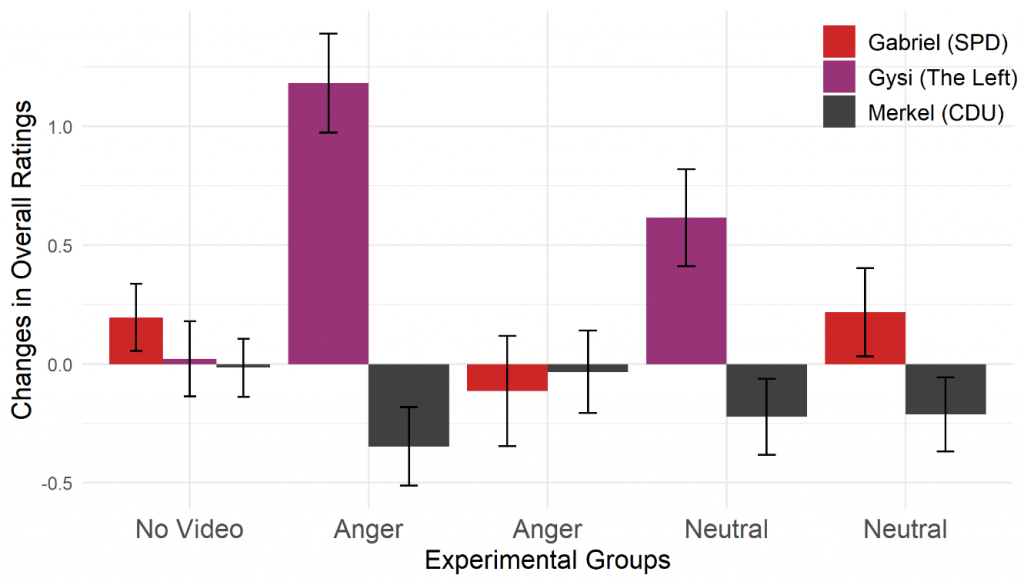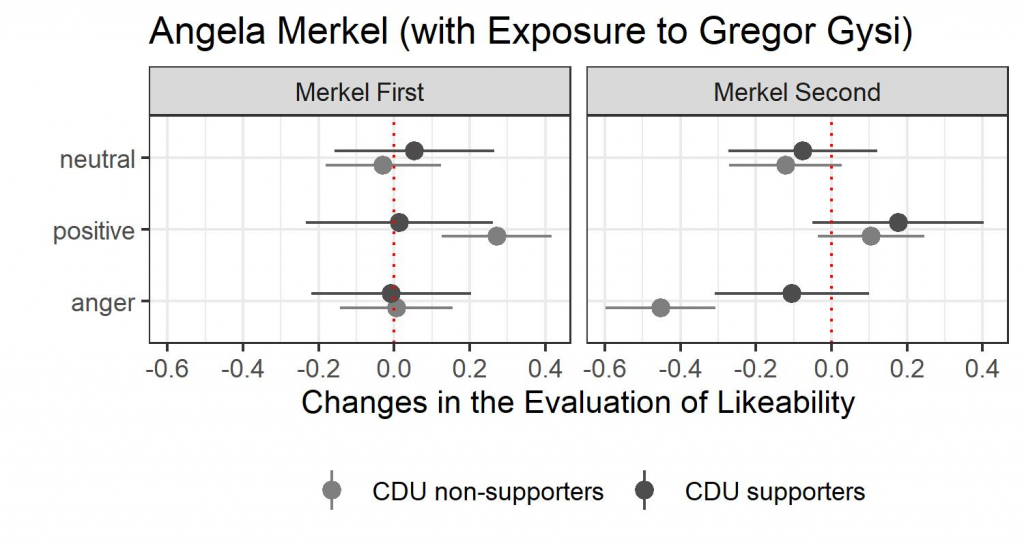When politicians make visible displays of anger, does it help or hinder their chances of winning support from voters? Drawing on a survey experiment in Germany, Lena Masch explains that displays of anger can have a significant impact on how voters view politicians, but that this effect is highly context-dependent.
With the rise in populist parties across Europe, the importance of emotional appeals in politics has gained considerable scientific interest. Politicians might express their emotions strategically during election campaigns to gain voters’ support and win elections. Expressions of anger are likely to be beneficial for politicians of the opposition and particularly populist parties since they are suitable for challenging the status quo. Previous studies have suggested there are two distinct sides to anger. On the one hand, it can be hateful and destructive, but on the other it can also be a positive force for addressing moral violations and bringing attention to perceived problems.
Expressions of anger might be a suitable way to signal political empathy, giving voters the impression that politicians care about the underlying issue and their interests. Previous experimental studies have investigated the effect televised appearances of political leaders can have on viewers. Building on sociopsychological and ethological assumptions, the effects of displayed emotions on viewers have been analysed – mainly with a focus on US politics and presidential campaigns ranging from Nixon’s to Trump’s facial expressions during TV debates.
In Europe’s predominantly party centred politics there has been little discussion about how emotional displays of political leaders potentially evoke affective states towards them and influence voters’ perceptions. With a decline in party attachments, a rise in vote switching and increasingly complex political issues, candidate perceptions might become more important for voters – even in parliamentary systems. Candidate images are easily obtainable in the digital age. In their simplest form they can function as information shortcuts and provide voters with an easily accessible heuristic for casting their ballot.
A survey experiment
In a recent study, I sought to analyse the various sides of anger and their effects on the evaluations of political actors. The study was based on an online survey experiment conducted in 2015 that included 1,726 participants. The participants were randomly assigned to experimental groups and shown videos of three leading German politicians: Angela Merkel, Sigmar Gabriel and Gregor Gysi. Each group was shown two out of the three politicians in various conditions. These included displays of anger, positive emotional displays and neutral expressions.
In her role as German Chancellor, Merkel was seen expressing anger most often at party conventions. Gabriel, the former Vice-Chancellor and leader of the Social Democratic Party, was more likely to express anger on political talk shows or toward other politicians. Gysi, the former leader of the Left, which was the largest opposition party in the Bundestag at the time of the experiment, was also seen expressing anger during political talk shows, particularly over issues of social injustice such as education standards and the minimum wage.
Figure 1 below illustrates the observed effects these videos had on participants’ impressions of each politician. None of the groups differed significantly in their impressions of Sigmar Gabriel. The group that was shown Angela Merkel and Gregor Gysi displaying anger exhibited a lower rating for Merkel, but the group that were shown videos of Gabriel and Merkel expressing anger had no significant change in their impressions. Both groups that were shown videos of Gysi expressed a more positive impression of him in the post-experiment survey, with his display of anger leading to a larger increase than the video in which he appeared neutral. This is important as the neutral video featured the same topics.
Figure 1: Changes in overall ratings of three German politicians by experiment group
Note: The chart is divided into different experimental groups. The first group was not shown any video material. The second group was shown Gysi and Merkel displaying anger. The third group was shown Gabriel and Merkel expressing anger. The fourth group was shown Gysi and Merkel with neutral expressions, while the final group was shown Gabriel and Merkel with neutral expressions. The bars indicate how impressions changed of each politician before and after the videos were shown.
Displays of anger affected the general impressions of the three politicians in various ways. This could be related to the varying degrees of emotional expressivity of each politician. Gysi’s anger was the most noticeable expression of anger according to external classifications using an emotion recognition algorithm by Microsoft Azure Cognitive Services. Likewise, participants in the experiment perceived his anger more easily compared to the other two politicians.
Furthermore, the status of politicians within the political system and the varying causes for their expressions of anger are likely to have an impact. Anger is more appropriate for opposition politicians like Gysi, especially if an unsatisfactory status quo is addressed. By addressing social injustices, anger can be tied to a good cause, resulting in more favourable evaluations. Gabriel’s anger, in contrast, was more frequently directed at other politicians and he showed signs of incivility. His anger had a positive impact on his evaluations as it presented him as a strong leader, but his uncivil behaviour did not lead to more favourable ratings overall.
The importance of context
There is some indication in the findings that perceptions of politicians are highly dependent on their circumstances and context. Political leaders are at times evaluated in comparison to each other and candidate appearances are likely to anchor perceptions of subsequent appearances for viewers. An illustration of this is that Merkel’s anger only led to more negative evaluations of her likeability and overall ratings when participants did not support her party (the CDU) and were previously exposed to Gysi’s ‘positive’ anger. When exposed to Gabriel’s incivility instead, her ratings did not decline. Figure 2 demonstrates this effect by showing the order of both video clips and participants’ party identifications as moderating variables.
Figure 2: Changes in Merkel’s likeability ratings according to treatment order and party identification
Note: The first box shows how impressions toward Angela Merkel changed when the video material of Merkel was shown before that of Gregor Gysi. The second box shows how impressions toward Merkel changed when video material of Gregor Gysi was shown first. In the second box there is a significant decrease in Merkel’s likeability ratings which is not apparent in the first box.
The effects of emotional expressions are highly context-dependent and the findings should essentially be seen as three case studies for three different politicians. This is true not only in the sense that candidates’ characteristics such as ethnicity, gender, emotional expressivity, charisma, and appearance (e.g. confidence) matter for how candidates are perceived and evaluated, but also because the political issues at stake, party identifications and the communicative setting itself are also important.
Candidates’ characteristics can potentially moderate the effects of anger: widespread stereotypes related to ethnicity and gender can influence the way in which displays of anger are assessed. Nevertheless, emotional expressions such as anger can shape the way politicians are perceived and may even spill-over into the evaluation of political parties. Given the potential for these effects to influence vote choices in increasingly polarised societies, further work on the impact of emotional displays and the circumstances under which they elicit reactions is clearly needed.
For more information, see the author’s recently published book with Nomos Publishing and accompanying articles (co-authored with Oscar W. Gabriel) in German Politics and Politics and Life Sciences
Note: This article gives the views of the author, not the position of EUROPP – European Politics and Policy or the London School of Economics. Featured image: Sigmar Gabriel. Credit: NATO (CC BY-NC-ND 2.0)





